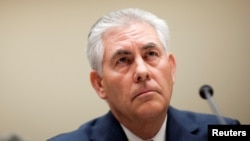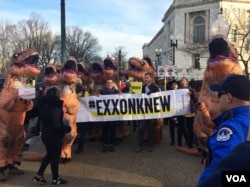On the day of his Senate confirmation hearing, Rex Tillerson, President-elect Donald Trump’s nominee for secretary of state, is facing questions about a decade-old report that the company he led once did business with state sponsors of terrorism.
A U.S. Securities and Exchange Commission report from 2006 has resurfaced with claims the oil and gas giant ExxonMobil conducted business with Syria, Sudan and Iran. All three countries were under U.S. sanctions for sponsoring terrorism at the time of the sales, between 2003 and 2005.
In a written response to the SEC report, ExxonMobil said the sales to these countries were mainly through another company, Infineum, a Europe-based joint venture between ExxonMobil and fellow oil giant Shell.
ExxonMobil said no U.S. employee was involved in the sales to the three countries. Tillerson was a senior executive during the time of the dealings, and he did not become CEO until 2006.
Tillerson speaks out
Tillerson was pressed on the matter this morning by U.S. Sen. Robert Menendez, D-N.J. Menendez said that Exxon lobbied against the Comprehensive Iran Sanctions, Accountability and Divestment Act and wanted to eliminate secondary sanctions, which make it difficult to do joint ventures like the ones Exxon undertook with Shell in Iran, Sudan and Syria.
Tillerson said he has never personally lobbied against sanctions, and to his knowledge, neither has Exxon. He indicated that his view of sanctions is complicated, however, and he does not always view them as a positive.
“Sanctions are an important and powerful tool, but designing poor sanctions and having ineffective sanctions can have a worse effect than having no sanctions at all,” he said.
Tillerson also pushed back against drawing conclusions about which countries he will favor as the top U.S. diplomat. He said that in his corporate life he worked for his shareholders, and as secretary of state he will work for the American people.
“My pivot now, if confirmed to be secretary of state, I will have one mission only and that is to represent the interest of the American people,” he said.
Various deals
The sales between 2003 and 2005 totaled $53.2 million to Iran, $600,000 to Sudan, and $1.1 million to Syria. Additionally, the chemical segment of Exxon sold polyethylene and polypropylene worth $67.7 million to Syria.
In its written response to the SEC inquiry, ExxonMobil stressed the small size of the deals compared to their global business, which totaled $371 billion in annual revenue at the time.
The company also said it didn’t alert the SEC to the sales at the time they occurred because the sales were both legal and relatively insignificant. ExxonMobil points out that Infineum is based in Europe and that no U.S. employees were involved.
“These are all legal activities complying with the sanctions at the time," Alan Jeffers, a media manager at ExxonMobil, told the newspaper USA Today. "We didn’t feel they were material because of the size of the transactions.”
Meanwhile, anti-corruption group Global Witness is urging the Senate to ask Tillerson about what it calls “questionable deals” in Nigeria, Angola, Equatorial Guinea and Chad. It says ExxonMobil dealt with autocratic regimes that entrench their people in poverty.
The group also charges that ExxonMobil has led efforts to eliminate policies aimed at reducing corruption and increasing transparency. ExxonMobil denies wrongdoing.













